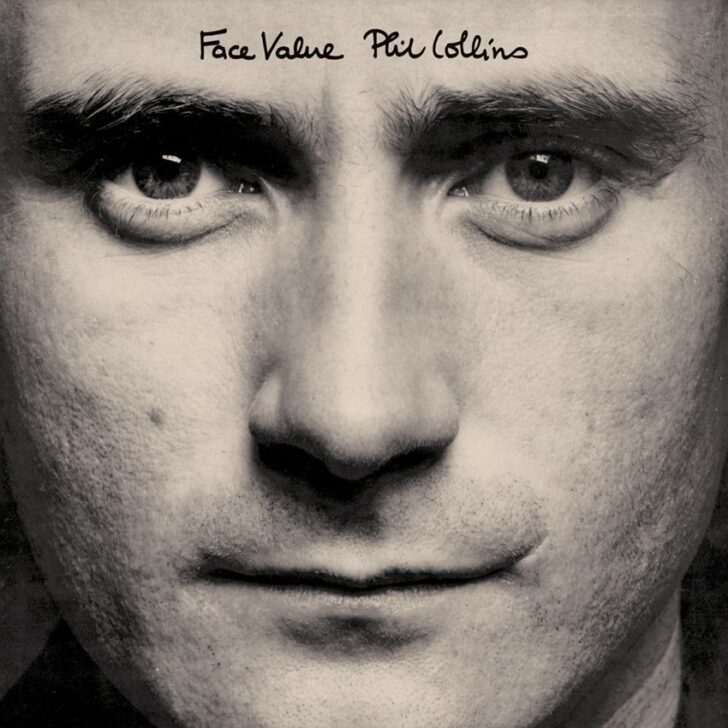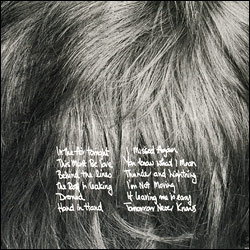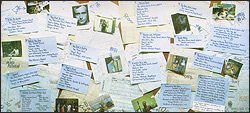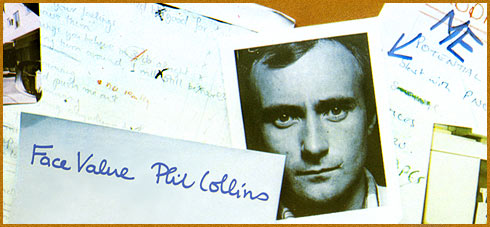- Article
- Read in 10 minutes
Phil Collins – Face Value – album review
When Phil Collins released his first solo album in 1981 he had been a member of Genesis for ten years and their singer for five years. Still he managed to create an extraordinary album with a touch of the “first time”.
Debut albums always have something special about them. For Genesis, it turned into more of a laughing stock, while Peter Gabriel’s and Steve Hackett’s solo debut albums were celebrated by fans and critics alike. Outside of Genesis, Pink Floyd created an extraordinary work, as did R.E.M. in the 80s. When Phil Collins thought about recording a solo album in 1980, he had no idea what would happen. And it seemed as if he didn’t know what could happen. Several decades later, “Face Value” is a legend and a masterpiece in music history. With twelve songs and without a real concept, he achieved a great success that would change everything.
Two things were crucial for Face Value. On the one hand, Phil tried to save his marriage – if necessary, at the expense of Genesis. On the other hand, Tony and Mike were busy with their own solo albums when he returned from his (failed) attempt to save his marriage. Collins started working even before Duke – but he only worked consistently on Face Value after the Duke tour.
Phil Collins had never really written a song by himself before. There were moments where he had a big part. Lilywhite Lilith, for example, Blood On The Rooftops, Los Endos, later Ballad Of Big and Down And Out or And So To F… for Brand X. But the fact that he brought his own independent songs into a Genesis production for the first time with Misunderstanding and Please Don’t Ask was a novelty. And so, influenced by the events surrounding his failed marriage, a series of songs emerged that couldn’t have been more personal.
Phil recorded most of it right at home, his fondness for the “home demo” has its origins here. Still, he didn’t intend to record an entire album. He wanted to process his private life. It was Ahmet Ertegün, head of Atlantic Records, among others, who encouraged Phil Collins to produce a full-fledged album. Gradually, he shaped his songs from his demos, and Face Value ended up with an amazing guest musician list. Daryl Stuermer was a logical choice, Eric Clapton an interesting choice at that time. Added to this were the Phenix Horns from Earth, Wind And Fire, jazz musician Alphonso Johnson, violinist Shankar, and finally Arif Mardin. Hugh Padgham was hired as producer. Phil had already worked with Hugh on the production of Peter Gabriel’s third solo album III (Melt).

Phil decided to use two more songs for the album. One was his own version of the Genesis song Behind The Lines, the other a cover version of the Beatles song Tomorrow Never Knows. Other songs were not used. Misunderstanding and Please Don’t Ask ended up on the Genesis album Duke, another demo with the working title How Can You Sit There only became a big hit three years later under the title Against All Odds (Take A Look At Me Now).
In The Air Tonight
There are many superlatives, but they don’t do justice to this song. In The Air Tonight is a grandiose piece of music, perhaps the most outstanding that Collins – or anyone from Genesis – has ever achieved. It’s ingenious how Collins lulls a depressive atmosphere and finally bursts it open with the most famous drum roll in music history. Unlike Phil Collins’ solo career as a whole, In The Air Tonight only got better – most recently it was the absolute highlight of the First Final Farewell Tour.
This Must Be Love
While In The Air Tonight spreads almost apocalyptic mood, This Must Be Love aims at exactly the opposite feeling of life. Phil met Jill Tavelmann during the Duke tour, whom he later married. This event inspired him to write This Must Be Love. It’s a declaration of love that today would be called kitsch. But Collins was completely unselfconscious in 1980/1981, and there aren’t many Collins ballads that reach the level of This Must Be Love. The bass loop by Alphonso Johnson (Weather Report) also became legendary.
Behind The Lines
It seems a bit strange that Phil Collins covers a Genesis song. At that time, however, it was by no means certain that Phil’s solo excursion would be successful. During the recordings for Duke, Genesis played the songs at double speed and Collins recognized a completely different potential in Behind The Lines than the disguised bombastic prog number it eventually became. His version has horns. And these give the song a whole new feeling, a groove, something funky. The song was always a hit live too – unfortunately Collins didn’t play it after 1995.
The Roof Is Leaking
The Roof Is Leaking proves that Collins wasn’t always just about heartache and togetherness. In a way, it’s related to This Must Be Love, but The Roof Is Leaking doesn’t trump with a brilliant bass line or a romantic melody, but seems disturbed, not least due to Eric Clapton’s guitar work. Years later, Collins regrets his decision to have produced the song too smoothly in the end – and raves about the “rough version” of the demos.
Droned
Shankar is not just anyone – he’s a virtuoso violin player. Collins almost had a guilty conscience about letting him play only small parts. Shankar himself took it calmly and remembered the extraordinary Face Value session at the end of the 90s: “We had no idea what he was up to – it could have become a fusion record, a rock album, an instrumental album. It was all spontaneous. He could change everything from one moment to the next. Phil reminds me of Frank Zappa”. And Droned is perhaps the piece with which Collins came closest to an oddball like Frank Zappa. The uniqueness of this jewel in Collins’ catalog is undisputed. How one can come up with such an idea remains his secret. But that Droned alone cannot live is proven by the next song:
Hand In Hand
It’s the same drum computer and the transition is very bumpy, but somehow fitting. That Phil is primarily a musician and secondarily a singer becomes clear on pieces like Hand In Hand. Louis Sattlerfield paid tribute to Collins’ talent: “He always gave us challenging things to play. Hand In Hand was one of the huffy-puffy songs for us”. Collins wanted horns and thus clearly distinguished himself from Genesis. Hand In Hand became a classic, which was an absolute concert highlight as an opener in 1990 and 1997.

I Missed Again
The second single from the album was a contrast to In The Air Tonight. It shows a playful Collins who ventures into the R&B corner. In 1981, this was something special, it was partly “black” music – even at that time there were enough stations in the USA that didn’t want to play such things because it mixed black and white music. Collins made this style mix socially acceptable – or at least has a share in it. I Missed Again became a top 20 success for Collins.
You Know What I Mean
The prototype of Collins ballads is not In The Air Tonight, but You Know What I Mean. Reduced to the piano and strings, Collins celebrates his pain with a broken voice – and it takes no more than two and a half minutes and two verses to achieve maximum effect. Rarely did he come close to this song in the following years of his career – Long Long Way To Go perhaps, We Fly So Close possibly – nevertheless You Know What I Mean remains untouched – a jewel!
Thunder And Lightning
Perhaps the most inconspicuous song on the album is Thunder And Lightning. Again, it’s the horns and an up-tempo feeling that carry the song. Overall relatively unspectacular, which doesn’t mean much in the shadow of the class of the overall album. Presumably, the song would have been a highlight in the context of many other albums.
I’m Not Moving
This is an up-tempo number that remains an exception in Collins’ catalog. Rarely has he sounded so funky, relaxed, casual. The piece lasts only about two and a half minutes, with Collins starting to sing almost shyly before the song develops into a kind of defiant “oh well” number. In 1993 at MTV Most Wanted, Collins played the song on the electric piano and hardly anyone recognized it…
If Leaving Me Is Easy
It’s not easy to hear Eric Clapton’s guitar work on If Leaving Me Is Easy. It’s much easier to appreciate Arif Mardin’s string arrangement. The song is undoubtedly a highlight of the album, and that’s despite the fact that it should actually be deadly boring. But the way Collins sings almost “broken”, the brilliant sax intro and the “wake-up-call” at the end round off the almost five minutes of music into something special. Collins didn’t play the song live often – he especially didn’t like that there was unrest in the audience during the song. If Leaving Me Is Easy is just not mass-produced, but an opportunity for the masses to get beer. Sometimes this is how the class of a song shows itself.
Tomorrow Never Knows
Hand In Hand played backwards? That exists, at the end of Tomorrow Never Knows. Somehow all genius albums have their moments. The finale of Face Value is Phil’s tribute to his biggest influence, the Beatles. He imitates and interprets John Lennon suspiciously well and with Tomorrow Never Knows he distances himself as far from Collins as Collins can distance himself from Collins. At the end comes another homage – Phil sings Over The Rainbow and suddenly Face Value escapes into nothingness – but before that you hear a fleeting “again”…

Eight songs, two cover versions, two instrumental numbers – Collins put together a musical package in 1980/81 that was close to his heart. He clearly distinguished himself from Genesis and leaned heavily out of the window, even if he was hardly aware of it. With Eric Clapton, Alphonso Johnson, Shankar, the Phoenix Horns or Arif Mardin, the then rather unknown drummer gathered an amazing list of guest musicians around him.
Face Value had to sink in after its release. Genesis were recording Abacab at the time when Face Value set out to conquer the world. The success must have been unreal for a man who had only staggered into the limelight from behind the drums five years earlier – and a great burden. It’s speculation, but presumably Face Value was a great burden for Collins. The success took away many casual elements of his music. The Frank Zappa that Shankar saw in Collins’ way of working on Face Value was gone afterwards and never came back. Maybe it’s good that Collins never tried to copy Face Value. Maybe he just couldn’t, even if he wanted to.
There are important years and decisive turning points in the history of Genesis. The departure of Anthony Phillips, the entry of Hackett and Collins in 1970/71. Gabriel’s departure in 1975 is without doubt also such a moment, as is Hackett’s departure in 1977. Peter Gabriel’s excursion into the mainstream and his artistic music videos were also such a moment in 1986. Or 1989, when Mike + The Mechanics also landed an American No. 1 hit after Genesis, Gabriel and Collins. Collins’ departure in 1996 and the announcement of the reunion tour in 2006 were also such moments. But perhaps the most artistically valuable moment took place in 1981 with the release of Face Value. That an album of such class can have such success is still amazing. That a band like Genesis produced such a variety of talented individual musicians is also amazing. Face Value could be THE album of the Genesis family. There are some classics – Selling England By The Pound, The Lamb Lies Down On Broadway, A Trick Of The Tail – or solo albums like 4 (Security), So, The Geese And The Ghost or Voyage Of The Acolyte – also later albums like Darktown and Up. But Face Value is somehow different. Maybe just better?
Autor: Christian Gerhardts
. At no point did we know what he was going to do. It was going to be a rock record, a jazz record, an instrumental album. Phil has this talent to follow a path, but is flexible enough to turn off somewhere else along the way. He reminds me of Frank Zappa” (Shankar)
. You walk into the studio and there’s Phil, looking like an English farmer” (Daryl Stuermer)
. Phil showed me these pieces of paper with dots and dashes and indicated how we should play it. I thought he was completely bonkers. But the money was right, so it was brilliant” (TomTom Washington)
. We were told to play for a certain Phil Collins. That didn’t mean anything to us. Then we were told he was a singer with Genesis – but that didn’t tell us anything either” (TomTom Washington)
“When people come and play me something that happens all the time and they think it’s good, I always tell them that if it’s going to be a hit, it has to be as good as this to be a hit – even if it’ll never come close” (Ahmet Ertegün on In The Air Tonight)

